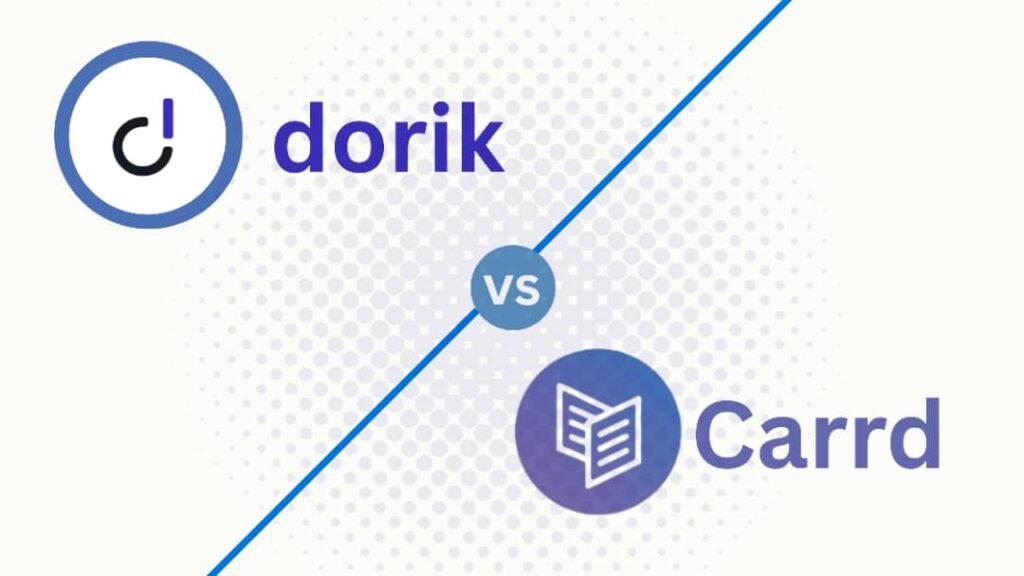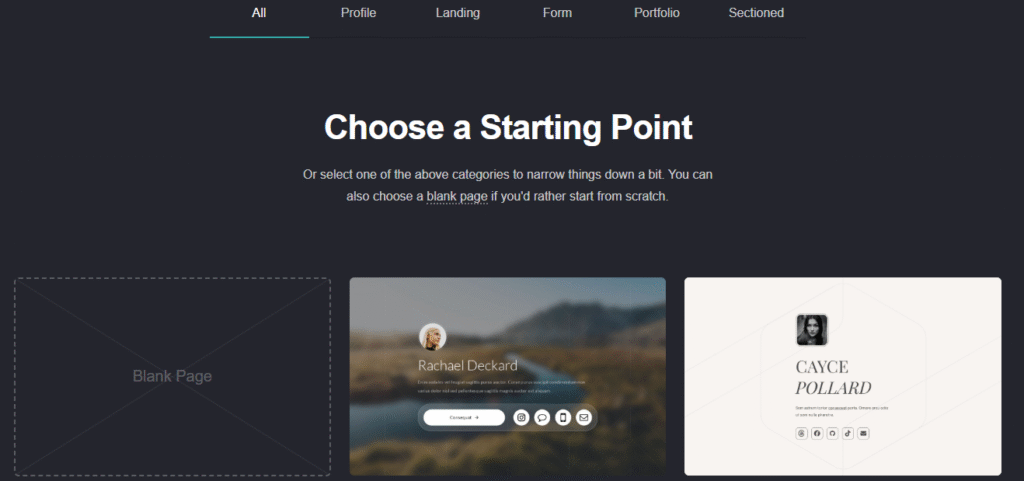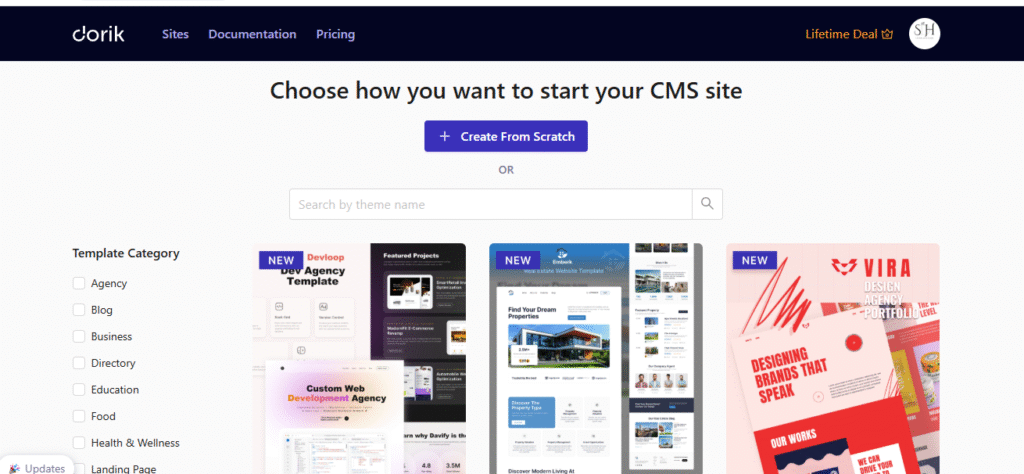By Abiola Gbolahan
Edited By Fredrick Oladipupo

Table of Contents
- Introduction
- Overview: Dorik vs Carrd
- Features Comparison
- Design & Customization
- Integrations & Extensibility
- Ecommerce & Payments
- Pricing Comparison: Dorik vs Carrd
- Ideal Use Cases: Dorik vs Carrd
- Ease of Use & Learning Curves
- SEO & Performance
- Community & Support
- Final Verdict: Which One Should You Choose?
1. Introduction
Nowadays, not every project needs a bulky, feature-heavy website. Sometimes, all you really need is a clean, fast-loading landing page and that’s where lightweight builders like Dorik and Carrd come in. These two no-code platforms have become go-to choices for freelancers, startups, and creators who want simplicity without sacrificing style.
In this Dorik vs Carrd comparison, we’ll explore their features, strengths, and limitations to help you choose the right tool for your needs in 2025.
2. Overview: Dorik vs Carrd
2.1 Dorik

Dorik is a modern no-code website builder that offers a smooth drag-and-drop experience with fully responsive components. Unlike many lightweight builders, Dorik supports not only landing pages but also blogs, CMS-driven content, and even multi-page websites. It’s especially popular among solo founders, SaaS startups, and freelancers who want more flexibility without touching code.
2.1 Carrd

Carrd has made a name for itself by doing one thing extremely well which is simple, beautiful one-page websites. It’s lightning-fast, easy to use, and perfect for portfolios, personal profiles, link-in-bio pages, and quick landing pages. Thanks to its minimalist design and affordability, Carrd is a favorite among indie creators, digital nomads, and anyone who needs to launch something fast.
3. Features Comparison
When comparing Dorik vs Carrd 2025, it’s clear that while both are designed for simplicity, they cater to slightly different needs. Let’s break down their core features:
Multi-Page vs One-Page Capability
Dorik allows you to build full multi-page websites, making it a great choice for those who need more than just a landing page like startups or personal brands with blog or service pages.
Carrd, on the other hand, is limited to one-page websites, which works perfectly for link-in-bio pages, portfolios, or temporary campaigns.
Custom Domains
Both platforms support custom domains, so you can brand your site professionally no matter which one you choose.
CMS & Blogging
With Dorik Pro+, you get access to a lightweight CMS and blogging system which is ideal for SaaS companies or founders who want to publish updates, case studies, or blog content.
Carrd does not support CMS or blogs, reinforcing its minimalist use case.
Responsive Design
Both Dorik and Carrd offer responsive design, meaning your site will look great on desktop, tablet, and mobile without extra effort.
Templates
Dorik provides 80+ modern templates, focused on business, portfolio, and startup themes.
Carrd edges ahead in quantity with 100+ templates, though they tend to be simpler in structure and geared toward personal or minimalist use.
Embeds & Widgets
Both platforms support third-party embeds, but Dorik comes with direct support for useful widgets like Maps and Calendly.
Carrd is more flexible with raw HTML embeds, allowing users to insert a broader range of tools manually.
Animations & Interactions
Dorik includes basic animations to add subtle interactivity.
Carrd offers simple effects like fade and slide transitions to enhance visual appeal without slowing performance.
4. Design & Customization
Dorik shines when it comes to design flexibility. Its clean, modern user interface makes it easy to build beautiful pages without touching code. The visual builder gives you fine-tuned control over layout elements like section spacing, fonts, colors, and even global design settings whick makes it a solid choice for users who want a polished and branded look.
While Carrd takes a different approach. It’s all about speed and simplicity. While it’s more limited in design customization compared to Dorik, that’s by design. The platform keeps things minimal and focused, making it incredibly fast to launch a sleek one-pager with just the essentials. Ideal for users who value minimalism over complexity.
5. Integrations & Extensibility
When choosing a landing page builder, integration options can make a big difference especially if you rely on third-party tools for marketing, analytics, or content management. Let’s see how Dorik and Carrd stack up in 2025:
Email Marketing
Dorik supports direct integration with major email platforms like Mailchimp, making it easy to collect leads and sync them with your campaigns.
Carrd allows email integrations as well, but only through embeds or custom HTML which might require a bit more technical know-how.
Forms (Native Support)
Both platforms come with a built-in form builder, so you can easily create contact or sign-up forms without external plugins. It’s plug-and-play on both ends, which is ideal for beginners and solo creators.
Analytics
Dorik integrates with Google Analytics and Facebook Pixel, giving you solid insight into user behavior and conversions.
Carrd also supports Google Analytics, Facebook Pixel, and Simple Analytics, making it just as capable for basic tracking needs.
CMS / Database
Here’s where Dorik pulls ahead especially for content-focused users. It offers a native CMS and integrates smoothly with Airtable, enabling dynamic content handling without writing a line of code.
Carrd, by contrast, has no native CMS, which limits its scalability for blogs or SaaS sites that rely on structured content.
6. Ecommerce & Payments
| Feature | Dorik | Carrd |
|---|---|---|
| Payment Integration | Stripe (via third-party like Gumroad, LemonSqueezy) | PayPal, Stripe, or Gumroad via embed or HTML |
| Ecommerce Capability | Basic – suited for digital products or service payments | Basic – great for quick sales and link-in-bio purchases |
| Ideal Use Case | Selling eBooks, services, SaaS waitlists, or digital files | One-product pages, quick donations, or link-based checkout |
| Built-in Storefront | ❌ No native storefront | ❌ No native storefront |
| Best For | Freelancers, SaaS founders, digital creators | Indie makers, personal brands, minimalist sellers |
7. Pricing Comparison: Dorik vs Carrd
When it comes to affordability, both Dorik and Carrd offer excellent value, especially for freelancers, indie makers, and SaaS startups. But their pricing models cater to slightly different needs.
7.1 Dorik Pricing
Dorik offers both personal and business plans. Here’s a quick breakdown:
| Plan Type | Price (Billed Annually) | Key Features |
|---|---|---|
| Free | $0/month | 1 website with Dorik subdomain, limited templates |
| Personal Plan | Starts at $18/month | Custom domain, SSL, form builder, 1 custom site |
| Business Plan | Starts at $39/month | All personal plan features + CMS, blogging tools, and Airtable integration |
| Lifetime Deal | $249 and $599 one-time for personal and buisness plan respectively | Pay once and use forever, includes all features |
7.2 Carrd Pricing
Carrd keeps things ultra-simple with a focus on one-page sites:
| Plan Type | Price (Billed Annually) | Key Features |
|---|---|---|
| Free | $0/month | 1 site with Carrd branding, limited elements |
| Pro Lite | $9/year | 3 sites, custom domains, no branding |
| Pro Standard | $19/year | 10 sites, forms, embeds, Google Analytics, higher upload limits |
| Pro Plus | $49/year | 25 sites, advanced controls, higher limits |
8. Ideal Use Cases: Dorik vs Carrd
| Use Case | Best Tool |
|---|---|
| Link-in-bio / Micro landing | Carrd |
| SaaS Landing Pages | Dorik |
| Portfolios | Carrd |
| Multi-page Service Website | Dorik |
| Simple Digital Product Page | Both |
| CMS-Driven Blog | Dorik |
9. Ease of Use & Learning Curve

Carrd is widely praised for its simplicity and lightning-fast setup. It’s ideal for total beginners whether you’re building a personal portfolio, link-in-bio page, or a quick landing page. You can have a fully functional site live in under 10 minutes without any prior design or technical experience. Its minimal interface reduces distractions and lets users focus solely on getting their content online fast.

Dorik, while also beginner-friendly, offers a bit more depth. Its layout flexibility, CMS features, and design customization make it a better fit for users who want more control especially those familiar with tools like Webflow or Elementor. The learning curve is slightly steeper than Carrd’s, but still manageable even for non-developers. It’s a solid middle ground between ease and power.
10. SEO & Performance
When it comes to SEO and performance, both Dorik and Carrd deliver impressive speed, but they differ in depth of SEO support.
Page Speed
Both platforms load quickly. Dorik benefits from a global CDN infrastructure that ensures fast load times across different regions. Meanwhile, Carrd is incredibly lightweight by design, thanks to minimal JavaScript which makes it one of the fastest platforms for one-page sites.
Meta Tags & SEO Tools
Dorik allows users to easily edit meta titles and descriptions, helping with on-page SEO right out of the box. Carrd also supports custom meta tags, but you’ll need a Pro plan to unlock full SEO capabilities.
Schema Support
Here’s where Dorik pulls ahead. Its Pro+ plan includes schema markup support, which can boost visibility in search engine results. Carrd, on the other hand, does not offer native schema support, which may limit SEO potential for more complex or data-rich pages.
11. Community & Support
When it comes to community and support, Dorik and Carrd take slightly different approaches but both offer valuable resources depending on your needs.
Dorik has a growing community, especially popular among solo developers, no-code enthusiasts, and SaaS founders. It offers active Discord support, where users can connect directly with the team and other builders. Dorik also maintains a help center with tutorials, regular product updates, and responsive email support. The development team is highly engaged, often incorporating user feedback into platform improvements, making it feel like a community-driven product.
Carrd, on the other hand, boasts a larger and more established user base, thanks to its simplicity and wide adoption among creators and indie hackers. It enjoys a strong presence on X (formerly Twitter), where its founder AJ shares updates and tips directly. While Carrd doesn’t have a live chat or large forum-based support, its minimalist email support is known to be quick and effective. The platform also provides concise documentation to help users get started and troubleshoot common issues.
12. Final Verdict: Which One Should You Choose?
| Criteria | Winner |
|---|---|
| Simplicity | Carrd |
| Customization | Dorik |
| CMS Support | Dorik |
| Price-to-Value Ratio | Carrd |
| Landing Pages for SaaS | Dorik |
| Link Pages & Portfolios | Carrd |
In a nutshell: If you’re seeking simplicity or affordability, especially for personal portfolios or quick link pages, Carrd is the winner. But if you need more customization, CMS or blogging support, or you’re building for SaaS, Dorik clearly delivers greater value.
Check Out More on Platformadviser
Want to explore more comparisons like this? Here are some recent posts that dive into similar decision-making:
- ChatGPT vs Jasper AI: Which is Best for Generating Marketing Content? – A detailed showdown between two top AI writing tools
- Runway vs Pictory: Best AI Tool for Video Editing and Content Generation – Which AI video editor fits your workflow?
- Taskade vs Reflect.app: Productivity & Teamwork Comparison – Unpacking the strengths of two emerging collaboration tools
- Shopify vs WooCommerce Comparison: E‑Commerce Platforms in 2025 – An in-depth look at which platform offers the best flexibility and value
- Vibe Coding: Shaping the Future of Programming – How a new paradigm is transforming developer productivity



Pingback: Survicate vs Typeform: Best for User Research & Feedback Loops - Platform Adviser
Pingback: Descript vs OpusClip: Best AI Video Editing Tools Compared - Platform Adviser